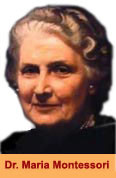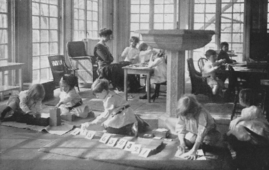Montessori Philosophy
Dr. Maria Montessori discovered long ago that the child under six has a miraculous ability to absorb their worlds. She called this “The Absorbent Mind”. The young child can absorb language, perfect movement and internalize order, developing from a helpless baby to a competent child in a few short years. Never will these sensitivities be more alive than in the early years of life. The young child is curious about everything and needs to explore and discover through purposeful activity.
The Montessori classroom is prepared with only the child in mind. The physical space and routines of the classroom are designed to maximize independent learning and exploration.
The Montessori classroom and activities encourage each child to move, touch, manipulate and make discoveries. The 3 year old who says “I can do it myself” is encouraged to do so. Learning tools are strategically placed so that children can easily reach what they need, without having to wait for adult help. Learning materials are self-correcting, so that the children learn by manipulating the material and they can be successful. Montessori developed learning materials to stimulate the child into discovery. Each piece of material is simple and carefully designed to appeal to the child at his or her stage of development.
Dr.Montessori noticed that the children do not learn from listening to an adult talk, but rather from the observation and experience. “When a child is happy in their environment he/she is interested in working and experimenting this leads to a calm and joyful learning experience- which leads to inner discipline.” The child has freedom to work independently, based on their own initiatives with gentle and respectful guidance from the teacher.
The Purpose
The Montessori approach to education is centered in the uniqueness and potentials of evolving child. The purpose is to develop the whole child into a well-rounded human being. Children enter this world with a natural desire to learn and to perfect themselves. Montessori education fulfills this instinctive need by providing a “Prepared Environment” where children are allowed the excitement of learning by choice rather than by force. Children acquire an “inner discipline” that will guide them to a self-development and self-learning.
Individualized lessons and instruction are given according to the interests and readiness of the child. The multi-age setting allows for modeling leadership, mentoring skills, and socialization between different age groups. In addition to academics, the program fosters virtues such as love, peacefulness, compassion and kindness. Children imbibe values of respect for nature, caring for and acceptance of other, and becoming a responsible member of the society.
Mankind’s basic tendencies are to explore, form order, imitate, abstract, imagine, form social groups, communicate, be independent, be obedient, be creative, learning discipline, participate in activities, repeat and calculate. As they are satisfied, habits for lifelong learning perpetuate and children are free to become independent thinkers and learners.
Montessori Education can be summed up in one sentence- “Children teach themselves”.
Dr. Montessori believed that no human being is educated by another person. He/She must do it for herself or it will never be done. Montessori wanted to extend learning outside the classroom. She wanted each child to be excited about learning and to take that knowledge and curiosity to higher levels-that is-to become a part of their lives and to continuously learn without limits!
Uniqueness of Montessori Methodology
The “Whole Child” approach: The primary goal of Montessori Method is to help each child reach their full potential in all areas of life. Activities promote the development of social skills, emotional growth, and physical coordination as well as cognitive preparation. The holistic curriculum allows the child to experience the joy of learning and to develop self-esteem and independence.
The “Prepared Environment”: The setting in which learning takes place is as equally important as the child and the teacher. Children of different ages are included in the same class , which has a relatively quiet, but yet busy atmosphere. The room is arranged for children allowing them to move and develop freely. The furnishings are child-size. Children totally involve themselves in their work. A Montessori classroom includes growing things and is bright and cheerful. There is a sense of structure and order; everything has a permanent place. Freedom of movement toward a definite goal is an integral part of the classroom.
Individualized Education: All children are different and need liberty for their individuality to develop. In the Montessori class, the child competes only with himself so success becomes its own reward. The impulses to learn must come from within; the child must wish to learn; consequently, rewards and punishments are unnecessary. A child’s work is different from that of an adult. An adult works to achieve an end. A child works for the process itself.
Montessori Materials: The Montessori materials are created to stimulate the child’s natural desire to learn, provide him/her with movement which will give him/her better control of his/her body and willpower, and enable him/her to move from a simple activity to a more difficult one. The materials are real objects, not toys. They are simple, attractive, well-made, and are arranged in sequence as to their difficulty or degree of complication. Before using any material, a child is given a lesson; the teacher takes cues from the child so that the child the child meets success with a minimum frustration. Montessori materials capture the child’s attention and initiate a process of concentration. Five principles are followed in determining Montessori materials. The concept is for the child to discover and understand must be isolated in a single piece of material.
- The materials progress from simple to more complex in design and usage.
- The materials are designed to prepare the child indirectly for future learning.
- The materials begin as concrete expression of an idea and gradually become more and more abstract representations.
- The materials are designed for independent use by the child. The control of error lies in the materials themselves, allowing the child to recognize his own mistakes.
The Teacher: Dr.Montessori called the teacher a “teacher” because she directs the child’s activity in the environment, rather than instructing each step of every process. The teacher is the vital link between the child and the environment. Teachers match the materials to the child’s needs, and have an open mind, a working knowledge and understanding of the child’s skills. The teacher is a role model, designer of the environment, resource person, demonstrator, record-keeper and observer of each child’s growth and development. The teacher encourages, respects, and loves each child as a special, unique individual; a teacher also provides support for parents and joins them in a partnership to nurture the development of the child.














